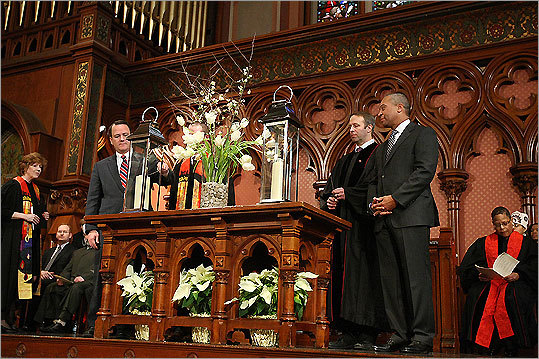Deval Patrick and Lincoln Chafee were sworn in as governors of Massachusetts and Rhode Island, respectively, last week, and how they chose to commemorate a certain aspect of their inaugurations is especially interesting.
In Massachusetts, Gov. Patrick attended a morning prayer service at Boston's Old South Church, a beautiful United Church of Christ building, where the Rev. Nancy S. Taylor led an ecumenical prayer service. Patrick, a Methodist, and his Roman Catholic lieutenant  governor, began the service by lighting candles at the altar, symbolizing hope and service. In attendance were representatives from every major faith tradition in Massachusetts, including a rabbi, an imams, ministers from Protestant, Evangelical, and Mormon denominations, Native American religious leaders, and Cardinal Sean O'Malley, who mentioned the service briefly on his blog. While the Governor and leaders from some of these traditions certainly clash on some issues, all gathered last week to pray for wisdom and guidance over the coming years.
governor, began the service by lighting candles at the altar, symbolizing hope and service. In attendance were representatives from every major faith tradition in Massachusetts, including a rabbi, an imams, ministers from Protestant, Evangelical, and Mormon denominations, Native American religious leaders, and Cardinal Sean O'Malley, who mentioned the service briefly on his blog. While the Governor and leaders from some of these traditions certainly clash on some issues, all gathered last week to pray for wisdom and guidance over the coming years.
Contrast this with what happened in Rhode Island. Gov. Chafee, an Episcopalian, broke with precedent and went without a prayer service before his inauguration as the state's first Independent governor. Further, Providence's bishop, Thomas J. Tobin, was not in attendance at Chafee's swearing-in, another break from the recent past. While both sides are quick to point out that the absence was due only to a scheduling conflict, Bishop Tobin penned a column in which he asks, "Has our state lost its soul?" Tobin specifically takes issue with Chafee's spokesman who said that the governor was foregoing a service because of his belief that the separation of Church and state must be respected. The governor's office clarified later, saying that the governor believes people should pray in their own preferred manner rather than at an officially organized event. In the end, Bishop Tobin celebrated a Mass at the cathedral for all state officials, and he was represented at the inauguration by a Catholic priest.
What can be gleaned from these two approaches to inauguration day prayer? Both men are obviously concerned that people of all faith feel welcome to the celebrations, but they went about realizing this goal very differently. In Massachusetts, leaders from a vast spectrum of faiths were invited to come together to offer various blessings to their state's chief executive. In Rhode Island, leaders were invited to stay home and pray as they like, or not at all. In Massachusetts, a minister friend of mine who helped to plan the service beamed happily on his facebook page that he was blessed to be part of such a special morning of faith and prayer. In Rhode Island, no such posts. What happened in Massachusetts is a hopeful example of the power of common goodwill that can result from face-to-face interaction. The lack of a service in Rhode Island isn't exactly troubling, but perhaps a bit disappointing. With so much vitriol and anger in our society, resulting in actions that can literally be deadly, any opportunity to come together to pray and to hope for peace and goodwill to God, any god, is worth celebrating. To go without such services is a lost opportunity for advancing peace and understanding.
A Tale of Two Inaugurations
Show Comments ()
1
Comments are automatically closed two weeks after an article's initial publication. See our comments policy for more.
Liam Richardson
14 years 3 months ago
It might help to consider the extraordinarily different histories of the Commonwealth of Massachusetts and the State of Rhode Island and Providence Plantations with regard to civic religious culture. Both are in New England, but represented opposing sides of a great divide.
The latest from america
Against the backdrop of deep differences with the Trump administration over migration and foreign aid as well as concerns for Ukraine and for Gaza, the Vatican secretary of state welcomed U.S. Vice President JD Vance to the Vatican.
Vance, who converted to Catholicism in 2019, attended the liturgy with his wife, Usha, a practicing Hindu, and his three children after meeting with Italian Prime Minister Giorgia Meloni earlier in the day.
My Catholic identity and my wife’s Protestant identity continue to endure, and our faith has developed together in greater harmony, knowing that our love for each other was ultimately grounded in our love for God.
the wily accuser
tempted him in just the way to confuse a savior:
All this I will give you.






